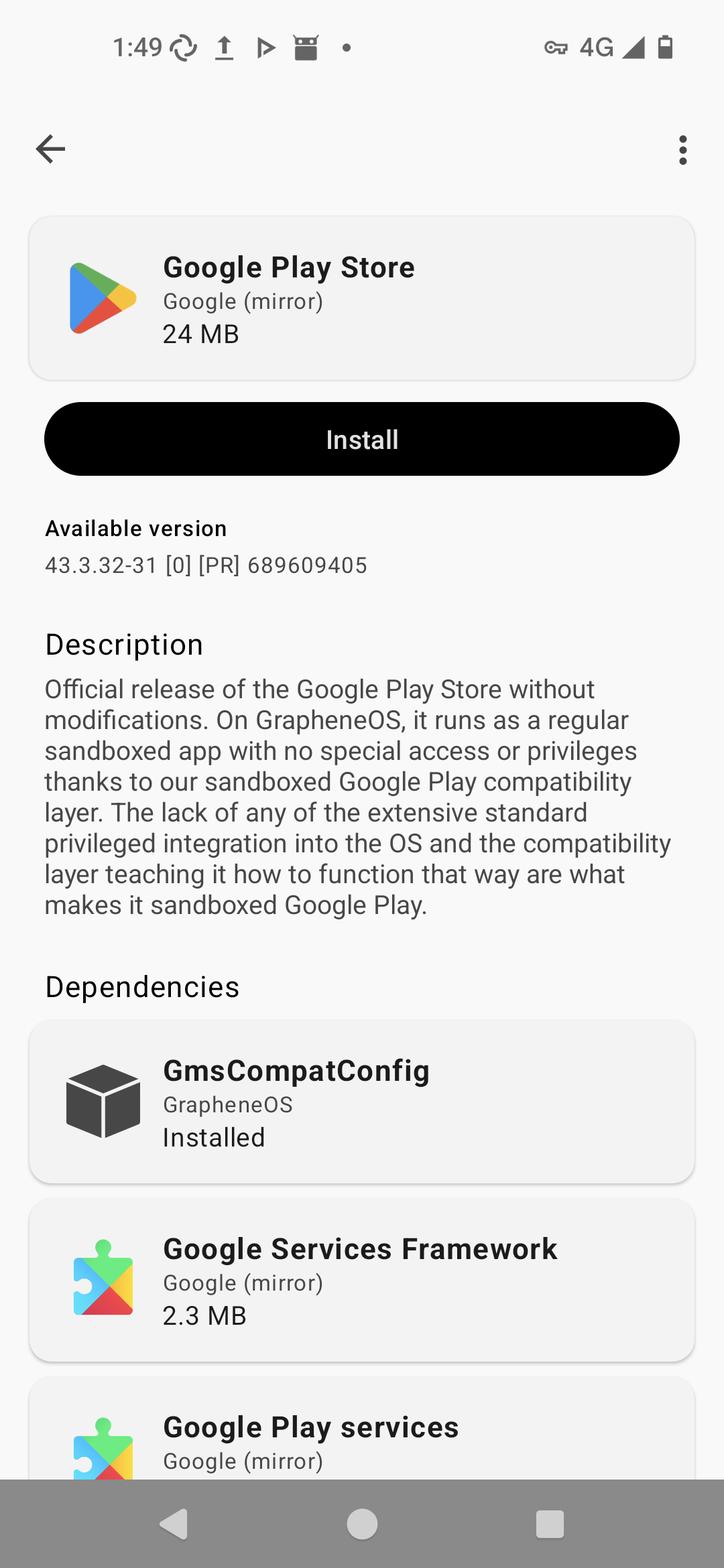I am a long term GrapheneOS user and would like to talk about it. r/privacy on the redditland blocks custom OS discussions which I think is very bad for user privacy, and I hope this post will be useful to anyone who are in the hunt for better privacy.
Nowadays smartphones are a much bigger threats to our privacy and Desktop systems, and unfortunately manufacturers has designed them to be locked down devices with no user freedom. You can’t just “install Linux” on most smartphones and it is horrible. And most preloaded systems spy on us like crazy. That was why I specifically bought a pixel and loaded GOS onto it.
According to https://grapheneos.org/features , they start from base AOSP’s latest version, imptoves upon it’s security and significantly hardens it. There’s hardened_malloc to.prevent against exploitation, disabling lots of debugging features, disabling USB-c data, hardening the Linux kernel and system apps etc. They even block accessing the hardware identifiers of the phone so that apps cannot detect whqt phone you’re using. That means with Tor and zero permissions given, apps are anonymous.
Compatibility with apps are best in Custom ROMs but there are still that can’t work, especially if they enforce device integrity. Very few apps usually enforce that tho. Also their community isn’t the friendliest but you can get help. Just don’t try and engage too much or have too many debates.
Anyone else here use GrapheneOS, or any other privacy ROMs? What is your experience? Do you disagree on any point? Let’s have a discussion!
I’ve been using it for just over 2 years now and am very happy with it. I am curious about CalyxOS though. While I don’t think I’d switch I’d be interested in a technical deep dive comparison between the 2.
I’m pretty sure that every Android Lemmy user has a Custom ROM installed on their device. Currently daily driving GrapheneOS on my Pixel 7 Pro.
Sending this from Lineage OS 21 ^^
Not me unfortunately … I used to have a Samsung Galaxy S9+ with an unofficial port of LineageOS. Nowadays I’m using a Samsung Galaxy S21 Ultra with the stock OS.
Maybe a Pixel should be my next phone, so that I get proper support for most custom ROMs.
Pixel 6a with GrapheneOS here. Been using for about a year and a half, and loving it.
Exact same setup here! Almost no problems. Also loving it
I don’t like the fingerpront sensor. Other than that it works great for me.
I’ve been using it on multiple devices for multiple years.
It works for me, and every app in want to use works. I’ve found that when they don’t, it almost always is broken on the stock OS also.
Using it since many years on many Pixels and loving it.
Main pros: zero bloat, efficient, highly secure and highly private (about as private and secure as it can get on any smartphone), and it’s an Android without any of Android’s typical weaknesses (privacy issues, bloat, etc.). You get to utilize the advantages of Google (its security) and completely avoid the disadvantages (its many privacy issues). You get to use all the advantages of an Android mobile OS while completely avoiding all of its disadvantages. It’s like getting your cake and eating it too. You’re much better off in terms of security and privacy than almost(?) all other smartphone users. According to leaked documents, Cellebrite for example can’t crack GrapheneOS on Pixels at all. They can crack almost any other smartphone if they have physical access to it. Most smartphones are really easy for them to crack. iPhones may pose some trouble depending on model/OS. And Graphene on Pixel is the literal brick wall. And even on top of that it has tons of great security features, like auto-reboot after X hours of inactivity, charge-only-mode for USB-C when locked, distress/duress PIN entry to immediately wipe the phone, many things like that. On the privacy side it’s looking great as well: Some folks have analyzed Graphene’s network traffic and there’s zero privacy issues from the OS or its built-in apps. And the few connections it does make (for updates and so on) are all documented and work exactly like they documented them, and they only transmit the exact least amount of necessary data without anything beyond that (guess what - that’s super rare). And on top of that there’s even more great privacy features, some of which are invisible but well thought-out, for example any SUPL request goes through a Graphene proxy server first (configurable) which strips all personally-identifiable data from the request and then redirects it to your provider’s SUPL server (which is most likely Google’s SUPL server in the end). I’m seriously impressed by the quality of the GrapheneOS project. Maybe you don’t realize how good and rare such things are nowadays. Also the documentation is very good and actually answers most of your questions and doesn’t contain any marketing blurb. The social media feeds and forums are a great source of info as well. On top of all that it’s even easy to install GrapheneOS.
Main cons: it’s only available on Google Pixel phones, so if you truly despise Google and don’t want to buy or use anything from them, it’s not the right device/OS for you (or maybe buy it used?). However, the reason GrapheneOS is on Pixel is purely a technical one: Pixels do offer very high hardware based security already (probably the most, although iPhones have good hardware-based security as well. As is known, Apple tends to be produce good quality hardware, not quite so good software) as well as a very high degree of “platform neutrality”, i.e. it’s supported by Google to flash a different OS on it or use more advanced tools like adb without any sort of tinkering or unnecessary danger involved. Also you don’t have to register to unlock your phone or anything, you only need to be online once to enable the OEM unlocking feature (I think this is because Google needs your IMEI to check whether the phone is carrier-locked (cannot ever be OEM unlocked) or can be unlocked, and they will immediately receive some device data including the IMEI as soon as you go online with the preinstalled Android OS once [of course they will receive some more device data than just the IMEI]), so it’s best to not insert your SIM yet (and not do anything with the preinstalled OS) before you’ve installed GrapheneOS on your new Pixel. Do the OEM unlocking step on WiFi only, best on a public WiFi so Google has much less of a chance to identify you based on your IP or related data. Then install Graphene, then insert your SIM and start using your new phone. Other cons exist but they’re rare or pretty much irrelevant in daily use. If you have to hear them, read an older post by me about some potential downsides: https://discuss.tchncs.de/post/19867254/12069767
A simple search will tell you a ton of people here use GrapheneOS and other custom ROMs. Are you karma farming?
I am. It’s good. Don’t have any issues just huge compliments to the team.
I have 1 Pixel 7a running Graphene, 2 Pixel 6a running Graph, 1 Pixel Tablet too, and Pixel 4a using DivestOS.
Top tier.
How do you like it on the tablet? I’ve been using CyanogenMod and LineageOS the longest time. Waiting for a Pixel tablet sellout.
deleted by creator
I post someone’s comment on a controversial topic about google and GOS. I saved it because that’s exactly how I feel.
Step 1 of installing GrapheneOS for de-googling your life: Buy a Google Pixel phone
Look - I know, I know. I get it. Google allows you to unlock the bootloader while maintaining the phone’s unique and excellent hardware security features. The argument makes sense. It is compelling. Other manufacturers do not give you this freedom. I am not arguing about that. I have a Pixel phone running GrapheneOS myself.
However… It is just so very obviously ironic that one needs to trust Google’s hardware and purchase a Google product to de-google their life through GrapheneOS. I think that it is a perfectly valid position for someone to raise their eyebrows, laugh, and remain skeptical of the concept either because they do not want to support Google at all, or because they simply will not trust Google’s hardware.
The reason why I think that this is “controversial” is because I have seen multiple instances of someone pointing out the irony, followed by someone getting defensive about it and making use of the technical security arguments in an attempt to patch up the irony.
With the lack of any other viable option, I struggle to see the point of the arguement.
I think buying a Pixel phone second hand solves this issue and reduces a little e-waste at the same time.
This. I never buy a Pixel new.
Yeah it’s ironic but what is the alternative? At least we CAN remove Google’s known spyware from the device, and there’s no evidence of firmware level spying. If you get Samsung, or some chinese crap, you can’t remove Google period, and you might get spied by the manufacturer as a cherry on top. There is no way to have a perfect solution, well unless Samsung starts to provide Custom ROM support or something.
I’m using a Fairphone with /e/os. No Google at all.
Not hardened though. I was heavily considering fairphone but over the back and forth between them discussing with Graphene developers, their hardware is not secure enough yet for graphene to be made for the fairphones. If and when fairphones are on graphene then I will definitely buy them.
Also, even though I commend their phone, the accessories for earbuds and headphones certainly bring up some questions as to their intentions.
It’s because Graphene is not a custom ROM. /e/os is. Graphene is just an OS on top of the ROM, and Fairphone doesn’t update their ROM often enough.
This is a complete non-issue though if you use a custom ROM like LineageOS or /e/os.
No. The issue is with hardware secure elements in how cryptographically intensive workloads are done
https://www.androidauthority.com/titan-m2-google-3261547/
Unfortunately the fairphone falls quite behind in this and relies on software salt and hash that can be exploited.
Buying a used pixel and installing Graphene OS is absolutely a more secure platform than any AOSP based open source bootloader unlocked ROM.
This was not given as reason by the devs why graphene is not on Fairphone. The delayed security updates were.
It’s a holistic statement that doesn’t factor into this.
If your objective is to punish Google, or to have nothing to do with Google. I completely agree with you using a pixel phone just doesn’t make any sense. You shouldn’t do it
If your objective is to have the most security possible… Then you should install graphene on a Pixel phone.
This is exactly why I don’t have graphene os, the irony of having to support google is too much for me call me paranoid but i also dont trust them with the hardware piece either lol. I’ve been running lineage os without gapps and its honestly great, updates and patches are every few weeks, super stable and awesome.
I assume you’re using it with bootloader unlocked. The issue is somehow some malware injects your phone and roots it, it can just install itself as a system service and just live there and you’ll never know. The security feature that protects against it is disabled once bootloader is unlocked.
Also I’ve heard that LineageOS has not all security updates present since some firmware updates needs to be provided by the specific manufacturer. For Pixel, Google provides it and GOS uses it.
Yes, a lot of people in this thread should look up the difference between a hardware based secure element and a salted hash.
I don’t have any answer for the point where you would not trust Google even for the hardware (even though I don’t think there is any risk on the current devices)
But concerning the “don’t want to support Google” an easier answer is to buy a second-hand Pixel
The point of not trusting Google hardware is that there is no way to know what hidden function is in there. De-lidding and reversing isn’t practical at current integration density. So, no, I don’t trust the hardware to not contain remoteable backdoors. But it’s a pretty high threat level.
i really want to make the switch but need to figure out how to steal a pixel phone bc i sure as hell ain’t paying for one
Buy used
I have the pleasure of using GrapheneOS. I can’t imagine using anything else. It was also the first (widely used) custom Android distribution to adopt Android 15. As far as I can tell, almost no others support Android 15 yet.
Ive used it for around a year and a half and never had any issues. My banking app stopped working after about 8 months but I just log in via a browser and it hasn’t effected my life at all.
For anyone considering the move here is a list of bank apps and their current working status as I know that is a big consideration people worry over.
The UBL app isn’t listed, hope it’ll work 🙏
You can always give it a run and add a report. Also, if it doesn’t work, give the app devs feedback that it is preventing you from using it. It might not be much but we can at least try to make our voices heard.
Yep. Been using it for about 2 years now. So far no issues except amazon prime but they gave me adds sufficiently annoying that i finally got around to setting up jellyfin. Been able to solve pretty much all my issues with dr gpt.
Every time i see someone posting about a new mobile phone exploit i get immense joy scrolling down through comments and finding someone posting the fact that graphene patched it 3 years ago and recommended a patch to google who have yet to implement it into base android.
Cellebrite and the new Grayjack or something both has zero ways to crack a GOS phone 🔥
How do you find it as a daily driver in terms of QoL features such as banking apps and payments etc?
Not a problem. Google Play is still available, with all apps you have today. If you want to run that, then it works allmost like stock but with more control over everything. Only thing missing is Google Pay and I strugle with RCS messages. I never use SMS so I don’t care about that one and it could be just me.
Alternatively you can run Google Play Services in a different, sandboxed profile if you’re going for privacy.
Thanks, that’s useful, I think it’s convinced me to finally switch
I use GrapheneOS but I don’t like how Google Play-centric it is. It is geared towards people installing their “normal” apps with the GrapheneOS special sauce sandboxing. No F-Droid by default where all of the FOSS apps are.
They are very security fovused and is against f-droid’s poor security practices. They do push accrescent through their stores tho
By default there is nothing, it’s a blank slate. It’s up to you to decide what apps to use.
Agreed. The Google implementations are there for folks who absolutely cannot go without certain apps only available from the Play Store. Upon installation, all that’s there is the OS with the necessary apps (camera, phone, browser, etc) with the security on these individual apps additionally patched.
With the sandboxing of Google Play and Services AND the option to further house these apps from the Play Store in a separate profile, you have a perfectly working device that the individual user can customise to their needs.
Its a great project and a real asset to the FOSS, privacy and security community against big tech/govt surveillance.
The phone is only as good as how you choose to set it up and use it.
Screenshot for you. Google is explicitly linked to for easy setup. F-Droid is not. “There is nothing” is simply disingenuous.

It’s not installed.
But it is Google Play-centric. There is an option to install Google Play. There is not an option to install other app stores like F-Droid, unlike some of the other AOSP clones.
Which I think is good. Make it easy for people wanting to test FOSS to do so.
Anyone who knows what they are doing will figure out how to install F-droid soon enough.
I find it hard to critisize it for something that makes it so much easier to start with for anyone.
Thanks for the downvote! Really helps lemmy become a more welcoming place when we are just having a civil discussion.
Having google play, and the auora store in the GOS apps system does reduce friction to install them vs f-droid, agreed, but it is a blank slate and its totally up to you.
My original reply to the OP’s question, thoughts and experiences with GrapheneOS, was along the lines of “I think GrapheneOS is Google-centric” and you disagreed saying that GrapheneOS was a “blank slate”. Honestly I think you’re being a bit defensive and maybe a little gaslighty which is why I downvoted.
GrapheneOS provides fairly prominent links to a Google Play installer or the relatively obscure Aurora Store. The Aurora Store client app is FOSS but the store is quite literally a proxy for the Google Play Store. The apps in the screenshots on Ausora Store’s homepage are mostly apps that use or require Google Play Services. This is all very Google-centric.
If Google Play wasn’t an important part of GrapheneOS, it could just not contain a prominent link to the Google Play installer. Or it could contain a link to install a fairly prominent app store that offers an ecosystem outside of Google Play. But it exclusively steers users to the Google Play ecosystem as a part of the default, packaged experience, hence my original reply to the OP.
I think google play is a necessary thing for them to distribute in the sandboxed google play harm reduction feature they advertise.
Ascrescent is the open source self-signed app store they promote, that is fully open, and its in their app store as well - but has very limited apps (organic maps, molly, but not fdroid inside)… but Ascrescent does not require the apps distributed to be open source… so just like google play
The reason they don’t include F-Droid is they have a weird cultural bias against fdroid signing apps… they don’t really speak to the relatively new fdroid reproducible build chain where the apps are signed by developers, but built by fdroid… which is the far superior security solution (verify the developers built it, and verify the source used in the binary is the published source) that no other app store offers.
I agree it would make sense for the GOS app installer to include fdroid, its weird that they don’t, but their line is only developer signed builds… which, google play actually does do… google play apps are developer signed.












